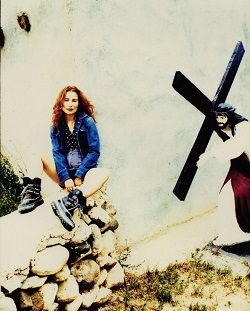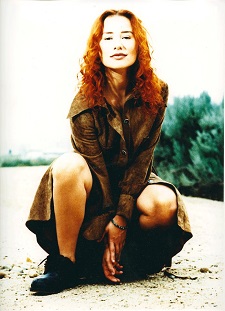|

songs | interviews | photos | tours | boots | press releases | timeline
SPIN (US)
March 1994


She-Creature of the Hollywood Hills
Tori Amos has been a classical pianist, a cheesy lounge act, a metalhead in thigh-high plastic jack-boots, and a victim of rape. She's a woman on a mission. Wm. Ferguson hears her roar. (Photos by Loren Haynes)
"Whores are good. We like whores."
Tori Amos's rental car has become a rollong confessional. Maybe it's the rhythm of the Hollywood Hills or the sudden flash of oncoming headlights on hairpin turns having a hypnotic effect, but it's not what you'd expect to hear from Amos. Little Earthquakes, her 1992 debut album, established her as the piano woman of her generation, sharing her quest for self through breathy ballads. Despite the formula -- a woman, a piano, and a few things about victimization she'd like to get off her chest -- Little Earthquakes resonated. It somehow managed to be both ethereal and down-to-earth. Equal parts Kate Bush and Carole King. Lyrically, Amos dealt in an everyday, do-it-yourself feminism -- kind of, I am woman, big deal. But the album's centerpiece was "Me and a Gun," a harrowing personal account of rape. Sung a capella, the song is frank but never preachy; the banal refrain -- "I haven't seen Barbados, so I must get through this" -- shifted the focus of the attack to her survival. It was politically correct and visceral. With almost no airplay, Little Earthquakes went gold virtually by word of mouth.
Her new record, Under the Pink, isn't a musical departure. The songs are all still piano-based, mid-tempo, introspective, retaining that same chimerical spirituality. The big difference is that Amos's theme has shifted. "I had to come to terms with my illusion of sisterhood," she says. "It's painful how women treat each other. This album talks about the real hurt of that betrayal... I have vivid memories of being a prostitute in another life. My New Age friends go, 'Oh, you really need some help.' I'm just like, 'No, you're full of shit if you don't talk to your own self.' I get tired of being judged by all my self-righteous, New Age women friends. I'm ready to stick my crystals up their ass."
Maybe it is the rental-car-as-therapy vibe at work, but she's overstating the case. There's nothing even remotely anti-woman on Under the Pink. Amos is still on the feminist/seeker tip. The only real change is that she's learning to embrace her inner whore.
And this is what Amos's inner whore looks like: She wears black plastic thigh-high boots, a red leather miniskirt, and has hair teased way out there.
"You've got to remember," she pleads, "there were millions that looked like me running around Los Angeles in 1988." She mulls over the image. "Sven the Viking in a miniskirt with no underwear," she says, a little proudly. "I was in my warrior phase."
When Amos moved to Hollywood, she abandoned the piano. In New Age parlance, this was a "denial of self." See, she's been playing the piano since she was two. By five she'd won a scholarship to study at a conservatory in Baltimore. After she was expelled at 11 for resisting classical training, she stayed with it -- a minister's daughter entertaining at jazz lounges and gay bars. Then she decided to go west.
"After playing 'Feelings' six times a night," she says, "I was wondering, What's the difference between that and giving a blow job to the head of Merrill Lynch? Everybody kept saying, 'This girl-and-her-piano thing is not gonna happen.' And I started listening." The result was Y Kant Tori Read, a lite-metal band fronted by Amos. The day the album came out, Billboard trrashed it, labeling her a bimbo. "I became a joke," she says.
A prodigy at age five, a bimbo by 24, Amos fled to London and underwent a transformation. If it sounds clichéd, well, so what: She rediscovered the piano and found herself. She also caught Thelma & Louise. Two hours after the matinee, she dredged up memories of her own rape and spat them back out in the form of "Me and a Gun." Then came Little Earthquakes -- "like a phoenix," she likes to say. "That woke me up, when I was a joke," she says. "I can look back and smile because that girl is with me now. She's not hurting anymore."
Having found her voice, having become the voice for a legion of women, Amos's heroic discovery process is over. The old wounds, she figures, are pretty much dealt with. Right now, she's got a few videos to shoot, and then she's off on a 250-date solo tour. After plumbing the depths on Little Earthquakes, she seems to have found her own strange sense of peace on Under the Pink. "This one is just... waking up each day."
Amos is idling along Sunset Strip, eyeing the current batch of rock-chick recruits. "There are going to be some bad days," she says, mostly to herself. "Bad days are not negative. You have to hold hands with bad days, you have to hold hands with sad." Amos gazes blankly out the windshield. "And once you get to know sad... she's got some sweet little dresses, you know?"
[transcribed by jason/yessaid]
t o r i p h o r i a
tori amos digital archive
yessaid.com
|